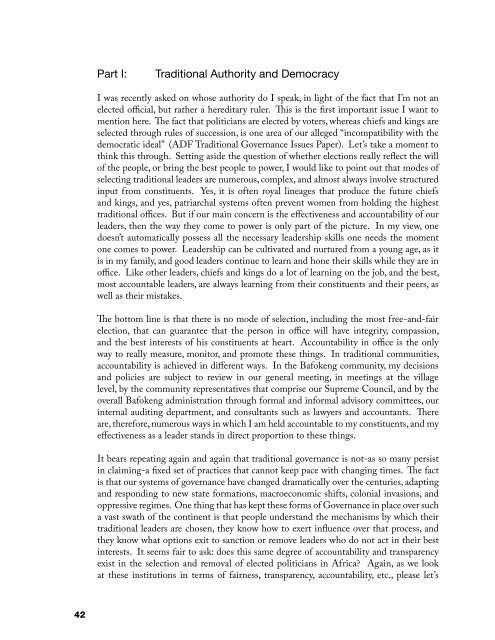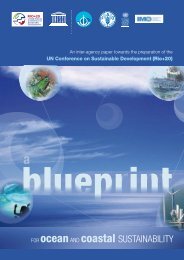Relevance of - United Nations Economic Commission for Africa
Relevance of - United Nations Economic Commission for Africa
Relevance of - United Nations Economic Commission for Africa
Create successful ePaper yourself
Turn your PDF publications into a flip-book with our unique Google optimized e-Paper software.
Part I:<br />
Traditional Authority and Democracy<br />
I was recently asked on whose authority do I speak, in light <strong>of</strong> the fact that I’m not an<br />
elected <strong>of</strong>ficial, but rather a hereditary ruler. This is the first important issue I want to<br />
mention here. The fact that politicians are elected by voters, whereas chiefs and kings are<br />
selected through rules <strong>of</strong> succession, is one area <strong>of</strong> our alleged “incompatibility with the<br />
democratic ideal” (ADF Traditional Governance Issues Paper). Let’s take a moment to<br />
think this through. Setting aside the question <strong>of</strong> whether elections really reflect the will<br />
<strong>of</strong> the people, or bring the best people to power, I would like to point out that modes <strong>of</strong><br />
selecting traditional leaders are numerous, complex, and almost always involve structured<br />
input from constituents. Yes, it is <strong>of</strong>ten royal lineages that produce the future chiefs<br />
and kings, and yes, patriarchal systems <strong>of</strong>ten prevent women from holding the highest<br />
traditional <strong>of</strong>fices. But if our main concern is the effectiveness and accountability <strong>of</strong> our<br />
leaders, then the way they come to power is only part <strong>of</strong> the picture. In my view, one<br />
doesn’t automatically possess all the necessary leadership skills one needs the moment<br />
one comes to power. Leadership can be cultivated and nurtured from a young age, as it<br />
is in my family, and good leaders continue to learn and hone their skills while they are in<br />
<strong>of</strong>fice. Like other leaders, chiefs and kings do a lot <strong>of</strong> learning on the job, and the best,<br />
most accountable leaders, are always learning from their constituents and their peers, as<br />
well as their mistakes.<br />
The bottom line is that there is no mode <strong>of</strong> selection, including the most free-and-fair<br />
election, that can guarantee that the person in <strong>of</strong>fice will have integrity, compassion,<br />
and the best interests <strong>of</strong> his constituents at heart. Accountability in <strong>of</strong>fice is the only<br />
way to really measure, monitor, and promote these things. In traditional communities,<br />
accountability is achieved in different ways. In the Bafokeng community, my decisions<br />
and policies are subject to review in our general meeting, in meetings at the village<br />
level, by the community representatives that comprise our Supreme Council, and by the<br />
overall Bafokeng administration through <strong>for</strong>mal and in<strong>for</strong>mal advisory committees, our<br />
internal auditing department, and consultants such as lawyers and accountants. There<br />
are, there<strong>for</strong>e, numerous ways in which I am held accountable to my constituents, and my<br />
effectiveness as a leader stands in direct proportion to these things.<br />
It bears repeating again and again that traditional governance is not-as so many persist<br />
in claiming-a fixed set <strong>of</strong> practices that cannot keep pace with changing times. The fact<br />
is that our systems <strong>of</strong> governance have changed dramatically over the centuries, adapting<br />
and responding to new state <strong>for</strong>mations, macroeconomic shifts, colonial invasions, and<br />
oppressive regimes. One thing that has kept these <strong>for</strong>ms <strong>of</strong> Governance in place over such<br />
a vast swath <strong>of</strong> the continent is that people understand the mechanisms by which their<br />
traditional leaders are chosen, they know how to exert influence over that process, and<br />
they know what options exit to sanction or remove leaders who do not act in their best<br />
interests. It seems fair to ask: does this same degree <strong>of</strong> accountability and transparency<br />
exist in the selection and removal <strong>of</strong> elected politicians in <strong>Africa</strong>? Again, as we look<br />
at these institutions in terms <strong>of</strong> fairness, transparency, accountability, etc., please let’s<br />
42
















